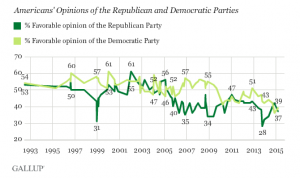The Importance of Political Parties
When the topic of political parties arises, initial associations often include partisanship and polarization. Many times, I’ve heard people say that the problem in our political system is that the division between political parties is too big, and the solution is to just “get rid of political parties and work together.” Recent polls (below) show that the American opinion of the two leading political parties is extremely unfavorable. However, there should be a distinction made between partisanship, and the functions that political parties serve. Furthermore, under our democratic system, the notion that it would be better to have one party than multiple conflictual parties is troubling. The United States is a significant-sized democracy, so it should be expected that constituents will have different opinions. In this case, popular sovereignty can only be promoted if people are allowed to voice their opinions, and political parties provide an excellent platform for doing so.
The main function of political parties is to mobilize people with similar ideologies concerning the economy, social rights, politics, etc. to help control governmental action. This is achieved by nominating and supporting candidates they believe will help get them what they want and helping as many possible get elected to office. Additionally, political parties serve to inform the public, keep the opposing party from gaining too much influence, and structure the government. From the start of political parties, with Thomas Jefferson leading the Democratic-Republicans and Hamilton leading the Federalists, political parties have helped mobilize groups of people who share similar beliefs, values, and wishes in policy.
Some people are so frustrated with the United States’ two-party system, and refuse to be associated with democrats or republicans, that they will identify as independents. Some independents claim that by having two major (controlling) parties and some states allowing closed primaries, they are excluded from the voting process. However, independents have a few options. They can join one of the smaller political parties or form their own if they desire. Even then, the political process is not excluding them since they can vote in the general election which is when it is truly significant. Most independents however will just vote for whoever they perceive as being the lesser evil so that their vote matters more than a write-in. Unfortunately, in the United States system of first-past-the-post, it is evident that people are incentivized not to vote for a lesser known candidate that they prefer, and instead vote for a well-known candidate that they prefer less simply because they believe it would be a wasted vote. In contrast, if a proportional representation system was adopted, voters could support the candidates they truly wanted to win without the fear of wasting their votes. This system would also potentially promote voter turnout rates for this reason.
Part of President Trump’s appeal to the American voters was that he wasn’t a prominent player in a political party, or even in politics. Traditionally, having some outsiders does help prevent too much corruption in politics. However, this does not mean that we should resort to extremely unusual means such as getting rid of political parties. America needs political parties to keep our government from becoming too disorderly. Without them, there would be severe limitations on ability to govern, balancing viewpoints, and keeping powers in check. What political parties should do however, is critically examine their structures and influences which cause the American people to distrust them so much. By re-evaluating party stances and structure, political parties could eventually gain back the support of the public and contribute to our political process in a beneficial manner.
Sources:
http://news.gallup.com/poll/181985/neither-major-party-cracks-favorability-latest-poll.aspx?utm_source=alert&utm_medium=email&utm_content=heading&utm_campaign=syndication
http://www.ushistory.org/gov/5a.asp
www.nytimes.com/2017/09/19/opinion/need-political-parties.html
